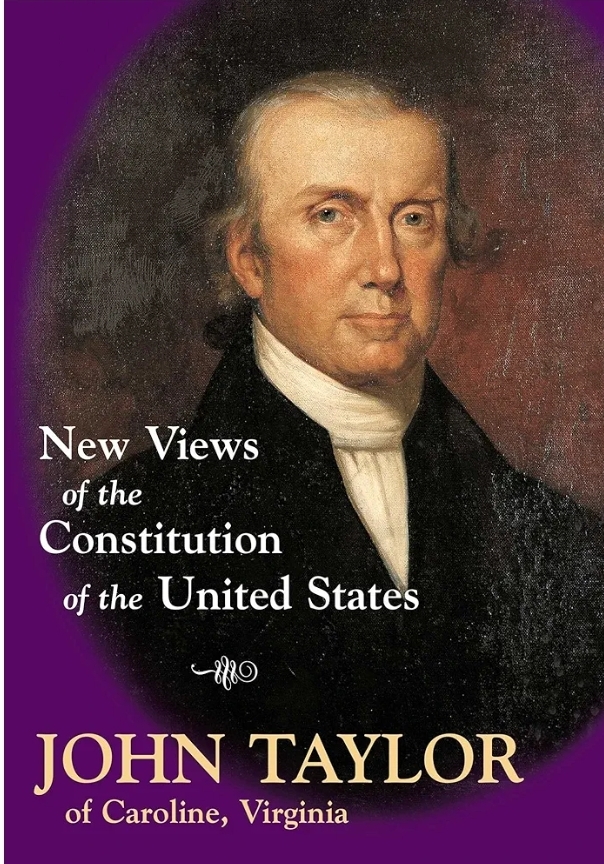John Taylor’s New Views of the Constitution of the United States is a seminal work published in 1823 that offers a states’ rights interpretation of the U.S. Constitution. Taylor, a prominent Jeffersonian political theorist and a strong advocate for agrarianism, critiques the increasing power of the federal government and argues for a strict constructionist reading of the Constitution, where most powers are retained by the states. His work is often seen as a foundational text for later states’ rights and nullification arguments in American political thought.
Main Themes of the Book:
- States’ Rights vs. Federal Power: Taylor emphasizes the primacy of state sovereignty in the constitutional structure, arguing that the states are the fundamental political units and that they voluntarily entered into a compact with limited federal authority. He was deeply concerned about the growing influence of the federal government and argued that this shift was a betrayal of the original understanding of the Constitution.
- Strict Constructionism: Taylor advocates for a strict interpretation of the Constitution, meaning that the federal government only possesses the powers explicitly granted to it by the Constitution. He warns against what he saw as a dangerous trend toward a broad interpretation of federal powers, which he believed would lead to a consolidation of power at the national level, threatening the liberties of the states and individuals.
- Compact Theory: One of the key arguments in the book is Taylor’s articulation of the compact theory of the Union. According to this theory, the Constitution is a compact or agreement between sovereign states. Therefore, any federal overreach could be met with resistance or even nullification by the states, who retain ultimate sovereignty. This idea would later influence the nullification crisis and the arguments used by southern states leading up to the Civil War.
- Critique of Federalism and the Judiciary: Taylor was especially critical of the federal judiciary, which he viewed as having overstepped its bounds by interpreting the Constitution in a way that expanded federal authority. He believed that the Supreme Court had too much power in determining the limits of both state and federal authority and that this was contrary to the principle of popular sovereignty.
- Opposition to Hamiltonian Federalism: A central part of Taylor’s critique is directed against the policies of Alexander Hamilton and the Federalist Party, which he saw as promoting a system of government that favored centralization, elitism, and commercial interests over the agrarian republicanism that he and other Jeffersonians supported. He opposed Hamilton’s national bank, his interpretation of the commerce clause, and his vision of a strong federal government.
- Agrarian Republicanism: Taylor was a proponent of agrarian republicanism, the idea that a republic should be composed of independent, land-owning farmers. He believed that centralization and industrialization threatened the independence and virtue of the citizenry, and that the federal government, through policies that favored banking and commercial interests, was undermining the republic’s agrarian foundation.
- Liberty and Government Power: Taylor’s overarching concern throughout the book is the protection of individual liberty from the encroachments of centralized power. He argues that a strong federal government inherently threatens liberty by concentrating power in the hands of a few, rather than dispersing it across a wide base, as is the case with state governments. For Taylor, the preservation of liberty is inextricably tied to the limitation of federal authority.
Impact and Historical Significance:
Taylor’s New Views of the Constitution became a cornerstone of states’ rights ideology and significantly influenced the development of Southern political thought in the antebellum period. His arguments would later be echoed in the nullification debates of the 1830s, particularly by John C. Calhoun, and would resurface during the secession crisis leading up to the American Civil War. Taylor’s work helped to shape the intellectual framework for those who argued that the Union was a voluntary compact that could be dissolved if the federal government overstepped its bounds.
Conclusion:
John Taylor’s New Views of the Constitution of the United States is an important historical text that provides a detailed argument for states’ rights, strict constructionism, and limited federal authority. His critique of federal power and defense of state sovereignty would resonate throughout American history, particularly in debates over federalism, secession, and the limits of constitutional authority. The book is essential reading for anyone interested in the development of American political theory and the historical debates surrounding the balance of power between the federal government and the states.







